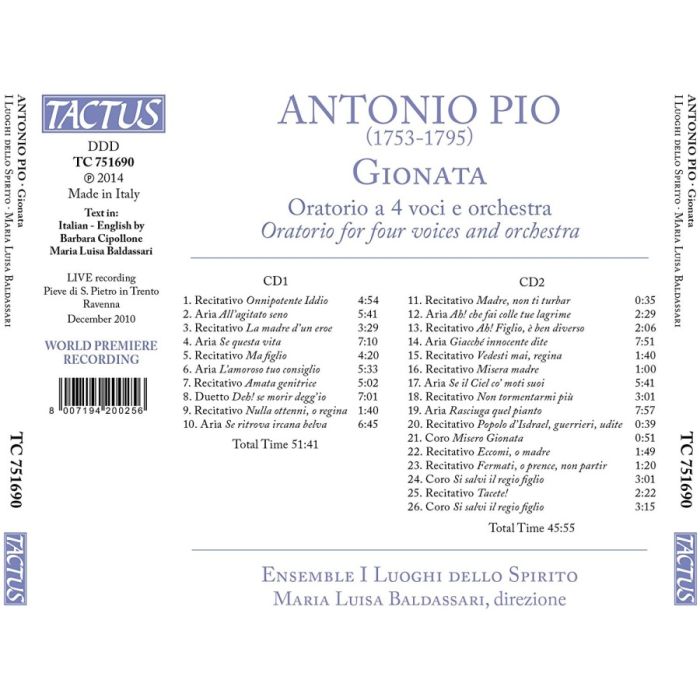
(Produkt nie został jeszcze oceniony)
kompozytor
Pio, Antonio
tytuł
Pio: Gionata (Oratorium)
wykonawcy
Baldassari, Maria Luisa
nr katalogowy
TC 751690
opis
As Renzo Calamosca relates in his book Musicisti ravennati nei secoli scorsi (Ravenna, Arti Grafiche, 1935), in the 18th century “there were very few musicians from Ravenna. One of them, however, was really outstanding: Antonio Pio, opera composer and music teacher at the court of Catherine of Russia, in the post that had been previously held by the celebrated Paisiello and Cimarosa”. Antonio Pio (1753-1795) belonged to a family that had originally come from Ferrara and had already given Ravenna several good musicians.
He studied at the Conservatorio di S. Onofrio of Naples under the guidance of Pasquale Anfossi, one of the most prolific opera composers of the 18th century. The Archivio Arcivescovile of Ravenna preserves the score of Pio’s Gionata. Oratorio a quattro voci con strumenti fatto l’anno 1779 per la solenne festa della translazione della Sacra Immagine di M. Vergine detta del Sudore nella Metropolitana di Ravenna l’ultima domenica di maggio (“Gionata. Four-part oratorio with instruments made in the year 1779 for the solemn feast of the translation of the Holy Image of the Virgin Mary called Our Lady of Sweat to the Main Church of Ravenna during the last week in May”). A specimen of the libretto is housed in the Biblioteca Classense of Ravenna.
The veneration of Our Lady of Sweat has remote roots in the city of Ravenna, and music has always worthily accompanied the end-of-May celebrations. Information about this particular cult of the people of Ravenna is supplied by Pietro Sulfrini in his book Cenni storici sulla miracolosa imagine della Madonna del Sudore venerata nella chiesa metropolitana di Ravenna, Ravenna, Tipografia del Seminario arcivescovile, 1859. The Archivio Arcivescovile preserves many musical manuscripts (particularly from the 19th century) that refer to this feast
He studied at the Conservatorio di S. Onofrio of Naples under the guidance of Pasquale Anfossi, one of the most prolific opera composers of the 18th century. The Archivio Arcivescovile of Ravenna preserves the score of Pio’s Gionata. Oratorio a quattro voci con strumenti fatto l’anno 1779 per la solenne festa della translazione della Sacra Immagine di M. Vergine detta del Sudore nella Metropolitana di Ravenna l’ultima domenica di maggio (“Gionata. Four-part oratorio with instruments made in the year 1779 for the solemn feast of the translation of the Holy Image of the Virgin Mary called Our Lady of Sweat to the Main Church of Ravenna during the last week in May”). A specimen of the libretto is housed in the Biblioteca Classense of Ravenna.
The veneration of Our Lady of Sweat has remote roots in the city of Ravenna, and music has always worthily accompanied the end-of-May celebrations. Information about this particular cult of the people of Ravenna is supplied by Pietro Sulfrini in his book Cenni storici sulla miracolosa imagine della Madonna del Sudore venerata nella chiesa metropolitana di Ravenna, Ravenna, Tipografia del Seminario arcivescovile, 1859. The Archivio Arcivescovile preserves many musical manuscripts (particularly from the 19th century) that refer to this feast
nośnik
CD x 2
wydawca
Tactus
data wydania
30.04.2014
EAN / kod kreskowy
8007194200256
63,00 zł
Produkt dostępny.
Wysyłka w ciągu 3 dni roboczych
Darmowa wysyłka dla zamówień powyżej 300 zł!
Darmowy kurier dla zamówień powyżej 500 zł!
sprawdź koszty wysyłki
